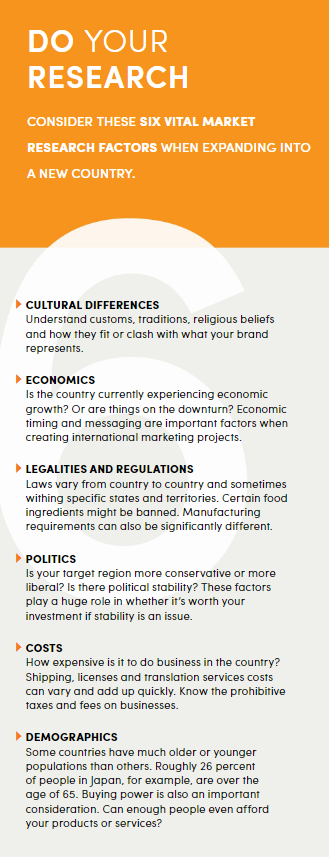Vital Factors for Marketing in Multiple Countries and Cultures.
Expanding business to other countries presents countless challenges. Your marketing strategy can vary incredibly. Some marketing and branding efforts can have a global appeal, while others need to be uniquely crafted for different cultures. Let’s look at three key issues to focus on when developing a marketing strategy when expanding into new countries.
1/ INDIVIDUAL VS. GROUP MINDSET

National cultures can lean more individualistic or collective. More individually minded countries, such as the U.S., tend to focus on achieving personal goals and react to more targeted marketing messages. Collective cultures, such as many Latin American areas, usually prioritize community or family values over individual people. “Standing out from the crowd” is sharply contrasted to wanting to feel part of a group. This can reflect the duality of the direct selling industry, leveraging individual relationships but also providing a group culture of like-minded people.
Different cultural mindsets can affect customer behavior. Customized products and even customized online navigation have become expectations in North American markets, but long-term brand reputation is more valued in collective-minded cultures. National brands tied to the country’s heritage are important in areas such as Costa Rica and South Korea. People can value those brands over newer or foreign ones.
Psychology Today offers these website design and content tips for individualist and collectivist countries.
Individualist Countries
- Give visitors a sense of personal achievement to motivate actions.
- Use content that uses novelty and difference to attract attention.
- Create competitions and challenges to engage your customers.
- Use controversial language (if appropriate).
- Attractive images should favor youth and material symbols of success.
Collectivist Countries
- Engage the community—“we” not “me.”
- Respect moral tenets, traditions and status.
- Be careful when using images—especially when depicting women or people smiling.
- Focus on wisdom and the experience of age.
- Show that you respect privacy and security of personal info.
2/ BRAND LOYALTY DIFFERENCES
As mentioned earlier, national identity can greatly influence brand loyalty. This can also apply to individual state, territories and cities. Napa Valley wines, Chicago deep-dish pizza and Central Texas barbeque are just a few cultural examples throughout the U.S. that create strong ties to local brands in the food industry.
Brand loyalty tends to be stronger in collective-minded countries. Cultural traditions can be a core pillar of brand loyalty. Creating loyalty programs, re-order incentives and long-term customer rewards can be more effective with this type of culture. Conversely, less brand loyalty means putting higher priority on convenience, price and promotion. This means people more likely willing to try new brands and open to trying samples.
Data research firm Qualtrics studied more than 17,000 consumers across 18 countries to calculate a “loyalty index” on how likely consumers in those countries are to trust, purchase more and recommend products and services. Here’s how the countries ranked from most to least loyal:

- India
2. Indonesia
3. Thailand
4T. Hong Kong
4T. Philippines
6. Malaysia
7. Mexico
8T. Singapore
8T. U.S.
10T. Australia
10T. Brazil
10T. UK
13. South Korea
14T. Canada
14T. France
16. Spain
17. Germany
18. Japan
3/ CREATE LOCALIZED MARKETING CAMPAIGNS
Localized marketing can involve an array of strategies from imagery, color selection, clothing, slogans, social media hashtags and even understanding local language or slang. For example, in America, McDonald’s is often called “Mickey D’s.” In Australia, it’s “Macca’s.” Buffalo Wild Wings is “Bdubs” and Target is “Tarjay.” The authentic consumer experience helps shape the brands, and this consumer-created culture can be leveraged for localized marketing campaigns.
As a direct selling example, anime is incredibly popular in Japan (and a roughly $20 billion export) and has spilled over into many forms of advertising. When Ambit Energy expanded to Japan, it created an anime-style cartoon named “Sparky” to help promote the launch.
Localized marketing might require unique online experiences for website visitors or creating multiple social media accounts geared toward different countries. The strategy and timing of social media posts can be affected as well. Choosing images for print and digital campaigns can vary based on cultural traditions, clothing, age demographics, lifestyles and even seasonal celebrations and holidays.
From the July 2022 issue of Direct Selling News magazine.


